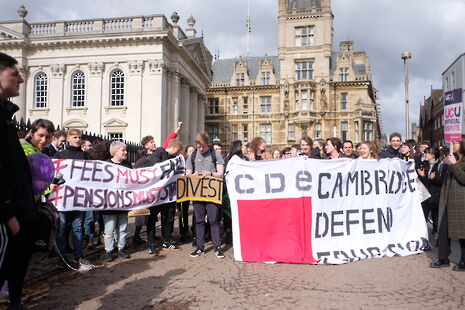Occupation declared ‘a success’ as activists emerge to join rally
Students and staff gathered on King’s Parade ahead of open meeting with the vice-chancellor

The five-day occupation of Old Schools has ended after activists emerged to join a mass rally on King’s Parade this afternoon, declaring their occupation “a success”, ahead of an open meeting with vice-chancellor Stephen Toope at 2pm.
Around 150 people gathered in the midday sun, banging pots and pans as CUSU Education Officer Martha Krish began the rally by leading chants of “Whose University? Our University”.
The Cambridge Defend Education activists who have been occupying Old Schools for five days could be first heard from Senate House Passage as they marched out of the Old Schools back entrance, chanting and bearing a large Cambridge Defend Education banner, to join the rally at around 12:20pm. The assembled crowd clapped and cheered loudly.
The occupiers began to lead chants of “They say marketise, we say organise”, and “Power! Power! Cambridge can you hear us? Getting louder by the hour”, before reading a statement together.
The activists said that they had “occupied to support striking staff”, adding that Cambridge “is our university and this week we occupied to take it back”, which was met with loud cheers.
They said their occupation had been “a success”, and thanked “everyone who has played a part”, before saying: “Now the long term fight begins”.
“Today the occupation ends”, they added, before ending their speech with: “Toope, see you at 2!”
Aerial shot of today’s rally — speeches still going on before #toopeassembly in just over an hour pic.twitter.com/iE91QNNcg8
- Louis Ashworth (@Louis_Ashworth) 16 March 2018
CUSU President Daisy Eyre then stepped forward to give a speech, beginning by telling the strikers: “It has been an honour to stand alongside you whenever we can”, and that the strikes have “been hard for everyone, but truly it has been worth it”.
She encouraged students and staff to “continue to stay strong, have strength”, adding: “I have so much hope that this situation could lead to amazing things. We have to hope.”
“We have shown that people, not capital, make up a university and that valuing staff is crucial and fundamental”, Eyre added, ending her speech by encouraging people to come to the open meeting with Toope at 2pm in Great St Mary’s Church.
Waseem Yaqoob, head of Cambridge’s UCU branch, then gave a speech about how it has been “a tough but incredibly inspiring month”.
“What better way to show how much staff student solidarity has happened than the occupation in the building right behind us?”, he asked the crowd, before joking that he was starting to sweat in the heat.
Yaqoob praised the strikes for pushing what he called a “a shitty defined contribution off the table”, and said: “The fight now is to achieve a decent defined benefit scheme”.
He said that that Cambridge’s UCU branch has “nearly doubled in size” during the strikes, and he lauded the branch’s new members, those “striking for the first time in their lives”, as well as the “students who have given them the confidence to go on strike”.
“Our industrial action is not suspended, it’s not even paused”, he continued, saying that UCU members are “going to work to contract, action short of a strike, we are not going to work a single hour more than we are contracted to”.
Anne Alexander, a prominent member of the Cambridge UCU’s industrial strike action committee, spoke next about the union’s next steps. She told the crowd: “The mass movement has brought forth leaders who haven’t done this before”, stressing that “We need to systematically encourage them. We need to build an even bigger movement.”
The past 14 days of strike action, which have spanned four weeks, had created: “a movement who have raised a lot more than political demands”, she said. Alexander spoke about the issues of racism, sexual violence in the university, divestment, and the alleged criminalisation of Muslim students through the Prevent strategy, for which organisation and discussion has seen a marked escalation in past weeks.
“These are issues we will take up in the Cambridge UCU and keep building”, Alexander remarked, and added that it would ultimately go towards building a “higher education system that is worthy of the name, and not simply a commodity to be traded on the global market”
“This is a movement of tens of thousands of people and we should be proud because we have built it in the past few weeks,” she said, leaving the crowd with a sense of reflection on the past four weeks of industrial strike action.
 News / Colleges charge different rents for the same Castle Street accommodation2 March 2026
News / Colleges charge different rents for the same Castle Street accommodation2 March 2026 News / News in Brief: waterworks, wine woes, and workplace wins 1 March 2026
News / News in Brief: waterworks, wine woes, and workplace wins 1 March 2026 News / Climate activists protest for ‘ethical careers policy’1 March 2026
News / Climate activists protest for ‘ethical careers policy’1 March 2026 News / Angela Merkel among Cambridge honorary degree nominees27 February 2026
News / Angela Merkel among Cambridge honorary degree nominees27 February 2026 News / Private school teacher who lied about Cambridge degree barred from teaching27 February 2026
News / Private school teacher who lied about Cambridge degree barred from teaching27 February 2026











